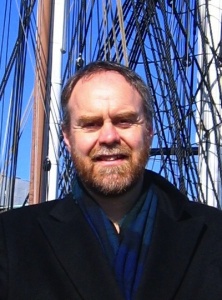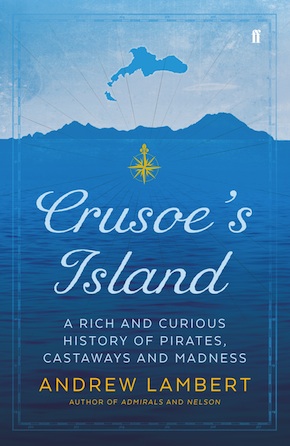Very like a whaler
by Andrew LambertAmong the great books of the sea, Herman Melville’s Moby-Dick; or, The Whale of 1851, has few peers. Around the simple narrative of Captain Ahab’s obsessive pursuit of the great white whale that had taken his leg, the whale’s deliberate destruction of his ship, and the loss of all but one member of the crew, Melville created an epic vision that melded the limitless ocean with the obsessions of a small community, the very real menace of the mighty sperm whale and the emerging American assumption of ownership over the vast Pacific. Melville used his own experience to draw together many strands of the Anglo-American imagination, along with the rich history of a savage trade, into a philosophy of the ocean.
Melville began his seafaring career in 1839 as a crewman bound from New York to Liverpool. He encountered another Yankee intellectual reflecting on his experience as a merchant seaman in Richard Henry Dana, Jr’s Two Years Before the Mast, a book that provided a sense of camaraderie, even kinship. How far Dana inspired his whaling voyage to the Pacific is unclear, but the example was fresh and strong. Not that Melville was the only budding author to see the opportunity. By the 1840s, American sea writing in the Dana mould was at its apogee. These stories were generally ‘useful’, reflecting first-hand experience, with an emphasis on authorial expertise. They recounted voyages in a ship-shape and seaworthy manner, rendering the romantic writings of Cooper and Irving passé. These texts relied on their journals, the inevitable commonplace book of recorded facts and readings. Melville would both play to the new sensibility, and subvert it, using the entomology section in Moby-Dick to connect, the more effectively to disguise his deeper purpose.
Melville’s Pacific was both a familiar and familial ocean. In 1827, when he was only eight, cousin Thomas wrote home from the USS Vincennes at the Peruvian port of Callao, anticipating a voyage among the islands. He visited the Marquesas, the islands that dominated Porter’s narrative, entering the Typee valley, home of a cannibal tribe. In 1831 his uncle bought the book that recounted these adventures, admittedly through the oft-averted eyes of Chaplain Charles Stewart. These experiences came tumbling in on Melville at an impressionable age: he and his elder brother idolised their cousin, and the impact of such exotic voyaging would become obvious. When he joined the whaleship Acushnet, Melville found an ideal environment for reading, listening and reflecting: the voyage would be long, and the library limited.
Melville listened intently to the tale of the whaleship Essex, stove and sunk by a giant sperm whale, [which] laid the foundations of a great book.”
In May 1841 the whaler may have passed in sight of Juan Fernández, or Más Afuera, but the voyage from Rio had been quick, there was no need to stop for refreshment. Instead Melville listened intently to the tale of the whaleship Essex, stove and sunk by a giant sperm whale, as told by Owen Chase’s son. This combination of disaster, starvation, cannibalism and the vast, glittering expanse of the Pacific laid the foundations of a great book. Still sailing north, the Acushnet met another whaler, and as the crew exchanged tall tales and domestic gossip Melville met Owen Chase’s son, borrowed a copy of the whaleship Essex narrative and entered a world of sublime imagery: “The reading of this wondrous story upon the landless sea & close to the very latitude of the shipwreck had a surprising effect on me.” He even imagined that he had seen Owen Chase, albeit at a distance. Later he obtained a copy of Chase’s book, which he greatly prized, filling it with annotations and notes.
Sailing across the South Pacific, the Acushnet’s crew began to suffer the effects of poor diet. There is little reason to doubt that Melville was already mildly scorbutic when he gave vent to a line about the Marquesas, the first island they stopped at. “No description can do justice to its beauty” could have been written by Chaplain Richard Walter a century before, wrapping romantic reveries of an island paradise in a suitably scorbutic confession of literary inadequacy. However, this island had something else to offer, something that was not available at Juan Fernández. Sailing into Nukahiva Bay on 23 June 1841, Acushnet was boarded by a bevy of naked girls and, as was customary, the rest of the day and the night were given over to an orgy, proving the veracity of David Porter’s account. “Our ship was now wholly given up to every species of riot and debauchery. Not the feeblest barrier was interposed between unholy passions of the crew and their unlimited gratification.” Melville’s claims that he stood aside, merely observing were, one suspects, addressed to his mother. They carry little conviction in the light of his subsequent actions.
When it came time to leave paradise, Melville deserted ship, “living in the garden of Eden before the Fall”. Three weeks later, obviously tiring of paradise, he joined another whaleship, before spending time on Tahiti, Eimeo, Maui and Oahu. Later he would pad out his version of castaway life with suitably modified extracts from Porter’s Journal, a book he only encountered after returning to the United States, and Chaplain Stewart’s altogether more restrained text. In 1842 Melville, sailing between Eimeo and Maui on board the whaler Charles and Henry, read an expurgated edition of Robinson Crusoe, and it is unlikely he ever went back to the original text. This version provided the basic guide for a white man writing about life among ‘savages’; it is likely he was familiar with similar editions from childhood, along with an equally sanitised edition of Gulliver’s Travels. Much was lost in such editions: violence, death and the exotic. These losses mattered because Melville would become ‘the Modern Crusoe’.
This was entirely appropriate, for while he became a castaway by choice, in the mould of Alexander Selkirk, Melville was quick to see that the purpose of voyaging was to arrive at strange and exotic places, and take the opportunity to immerse himself in their exoticism. He would be a mariner by necessity, a poet by sensibility and an author by trade.
From Crusoe’s Island: A Rich and Curious History of Pirates, Castaways and Madness
 Andrew Lambert is Professor of Naval History at King’s College, London. His previous books include Nelson: Britannia’s God of War, Admirals: The Naval Commanders Who Made Britain Great and Franklin: Tragic Hero of Polar Exploration. His highly successful history of the British Navy, War at Sea, was broadcast on BBC Two. Crusoe’s Island is published by Faber & Faber.
Andrew Lambert is Professor of Naval History at King’s College, London. His previous books include Nelson: Britannia’s God of War, Admirals: The Naval Commanders Who Made Britain Great and Franklin: Tragic Hero of Polar Exploration. His highly successful history of the British Navy, War at Sea, was broadcast on BBC Two. Crusoe’s Island is published by Faber & Faber.
Read more.


